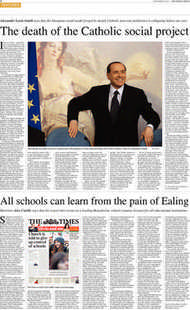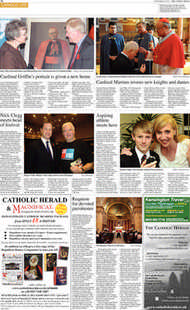Page 12, 18th November 2011
Page 12

Report an error
Noticed an error on this page?If you've noticed an error in this article please click here to report it.
Tags
Share
Related articles
In Memory Of Ted
Why Should We Remember The Dead Of War?
Is Poppy For Remembrance?
Important To Remember
The Incomparable Beda
Remembrance Sunday will not fade away
About a million British soldiers were slaughtered in the First World War. How often do we confront that hideous truth? It’s far easier to pin on our poppies, stay silent for two minutes, and then forget it all for a year.
But some horrific details about the Great War, often learned at school, will haunt us for a lifetime. I’ll never forget gathering around the war memorial at Downside on those damp November mornings.
The monks and boys would remember the 109 Old Gregorians who – because they were members of the school’s Officer Training Corps – were sent straight to the trenches as “officers” and died there, often as teenagers. There I’d stand, wearing my Combined Cadet Force uniform, thinking: “Ninety years ago it would have been us.” From 1919, Armistice Day was above all about remembering the fallen: November 11 wasn’t about victory or the survivors; it was about the lost generation: “They shall grow not old, as we that are left grow old.” During the Second World War this changed slightly. The two minutes’ silence was moved to the nearest Sunday to avoid interference with wartime production. And the British people began to observe both days: Armistice Day to remember the fallen from the First World War, Remembrance Sunday to remember the dead from both wars.
Very naturally during the following decades, this has changed again. Remembrance Sunday has become more like the American Veterans’ Day. The war dead are remembered with wreaths at the Cenotaph, but the focus is increasingly on the marchpast afterwards. In short, we salute those who were left and grew old – the men and women who defeated a terrible evil and who proudly marched down Whitehall last Sunday, along with veterans from subsequent wars.
Now, I believe, an important and final change is happening to Britain’s annual period of remembrance. There are no living veterans of the First World War. And before long there will be few surviving veterans of the second. Millions of Britons, over the past 10 years or so, will have lost parents or grandparents who fought in that war or who lived through it. That includes me: my grandfather, Richard Heaven, fought in North Africa and Italy and was awarded a Military Cross. He died in 2009.
So at this time of year we are remembering the most significant moment in our parents’ or grandparents’ lives – their finest hour – and we are mourning them and celebrating what they did for Britain. The idea is symbolised by the children who march with the veterans, wearing their grandfathers’ medals. It’s why I am certain that Armistice Day and Remembrance Sunday will become more important to our national life over the coming years, not less.
Last week, I was lucky enough to see the Leonardo da Vinci exhibition at the National Gallery. The highlight for me was not one of the loans from abroad, but was the Burlington House Cartoon, owned by the National Gallery. It’s a charcoal drawing that shows Mary sitting on her mother’s lap, holding Jesus; St Anne’s unfinished hand points heavenwards.
Here’s a contemporary account of it from the 16th century: “[Leonardo] made a cartoon, in which there was an Our Lady and a St Anne with a Christ, which not only made all the craftsmen marvel, but when it was finished for two days men and women, young and old went to see it in the room, as one goes to solemn festivals, to see the marvels of Leonardo that stupefied all the people...” Five hundred years on, it was a privilege to be stupefied too.
Will Heaven is assistant comment editor of the Daily Telegraph
blog comments powered by Disqus





















